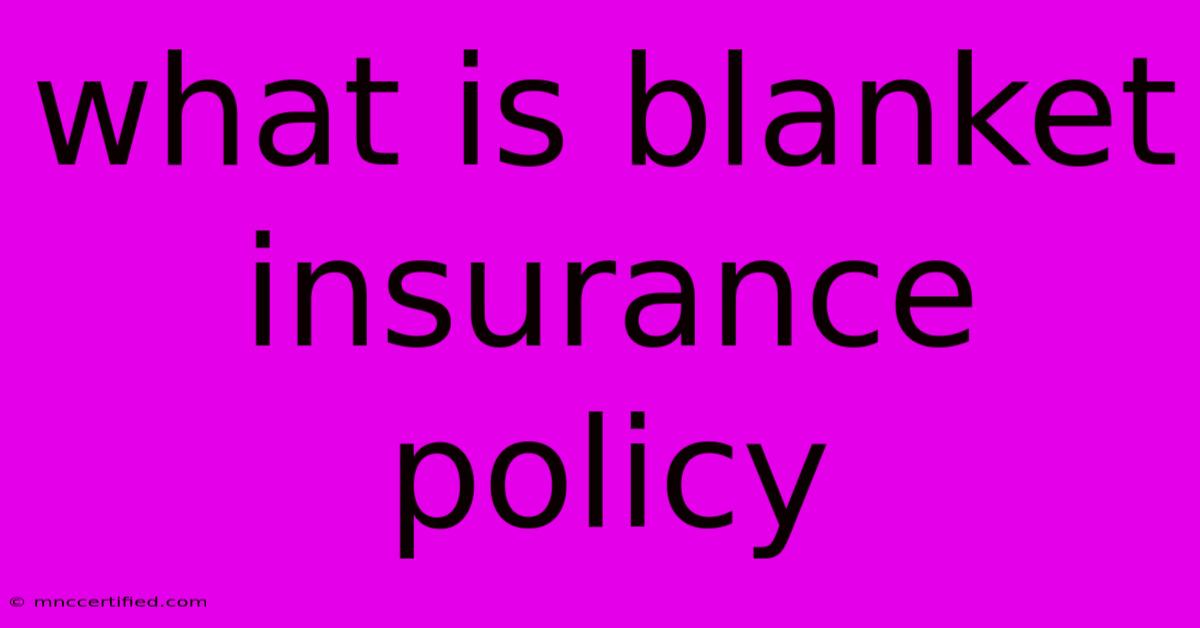What Is Blanket Insurance Policy

Table of Contents
What is a Blanket Insurance Policy? Your Comprehensive Guide
A blanket insurance policy offers a broad scope of coverage, unlike specific policies that cover individual items or risks. This makes it a versatile and potentially cost-effective solution for businesses and individuals with diverse insurance needs. But what exactly is a blanket insurance policy, and is it right for you? Let's delve into the details.
Understanding the Scope of Blanket Coverage
The key characteristic of a blanket insurance policy is its broad coverage. Instead of listing individual items or risks, it provides protection for an entire category of assets or liabilities. This simplifies the insurance process and can be more efficient than managing multiple, specific policies. Think of it as an umbrella of protection covering a wide range of possibilities.
Examples of Blanket Insurance Policies:
-
Blanket Liability Insurance: This covers a company's liability for various potential claims, such as bodily injury or property damage, across multiple locations or projects. This is particularly useful for businesses with widespread operations or those frequently working on different sites.
-
Blanket Crime Insurance: This protects against various types of crimes, including employee dishonesty, forgery, and theft, covering all locations and assets within a defined category. This offers a streamlined approach to securing a business against financial losses due to criminal activity.
-
Blanket Medical Insurance: This isn't as common as the other types, but in some cases, a blanket medical insurance policy can cover a group of people, offering broader protection than individual health plans. This is sometimes seen in employer-sponsored schemes or community-based initiatives.
-
Blanket Bonds: These bonds cover multiple projects or individuals under a single bond. Common examples include contractor bonds covering multiple jobs or a surety bond for a large group of employees.
Blanket Insurance vs. Specific Insurance: Key Differences
The main difference lies in the granularity of coverage. Specific insurance policies target individual items or risks (e.g., insuring a single piece of equipment or a specific location). Blanket policies, on the other hand, provide a broader, more generalized coverage.
| Feature | Blanket Insurance | Specific Insurance |
|---|---|---|
| Coverage Scope | Wide-ranging, encompassing a category | Focused on specific items or risks |
| Policy Details | Fewer specific items listed in the policy | Detailed list of insured items/risks |
| Administrative Burden | Generally lower | Potentially higher, with more to manage |
| Cost | Potentially lower (depending on factors) | Can be higher if multiple policies needed |
Advantages of a Blanket Insurance Policy
- Simplified Administration: Managing fewer policies reduces paperwork and administrative costs.
- Potentially Lower Costs: Consolidating coverage can lead to cost savings compared to numerous individual policies.
- Broader Protection: Provides comprehensive coverage across a wide range of potential risks.
- Increased Efficiency: Streamlines the insurance process, saving time and resources.
Disadvantages of a Blanket Insurance Policy
- Less Detailed Coverage: May not provide the same level of detail or specialized protection as individual policies.
- Potential for Higher Premiums: In some cases, a blanket policy's premium might be higher than expected, especially if the covered category is broad and high-risk.
- Complexity: Understanding the policy's scope and exclusions requires careful review.
Choosing the Right Policy: Factors to Consider
Before opting for a blanket insurance policy, consider:
- Your specific needs: Assess your risks and the scope of protection required.
- Cost-benefit analysis: Compare the cost and coverage of a blanket policy against individual policies.
- Policy terms and conditions: Thoroughly review the policy document to understand its exclusions and limitations.
- Insurance provider: Choose a reputable insurer with strong financial stability.
Conclusion: Is a Blanket Insurance Policy Right for You?
A blanket insurance policy offers a streamlined and potentially cost-effective way to manage diverse insurance needs. Whether it's the right choice for you depends on your specific circumstances and risk profile. Careful consideration of the advantages and disadvantages, along with a thorough review of your needs, will help determine if a blanket policy provides the optimal insurance solution. Remember to always consult with an insurance professional to discuss your options and find the best fit for your unique requirements.

Thank you for visiting our website wich cover about What Is Blanket Insurance Policy. We hope the information provided has been useful to you. Feel free to contact us if you have any questions or need further assistance. See you next time and dont miss to bookmark.
Featured Posts
-
Blair Remembers John Prescott
Nov 21, 2024
-
Night Guard Covered By Insurance
Nov 21, 2024
-
Icbm Launched Russia Strikes Ukraine
Nov 21, 2024
-
Tory Party Alex Burgharts Rise
Nov 21, 2024
-
Live Banker For Today Prediction
Nov 21, 2024